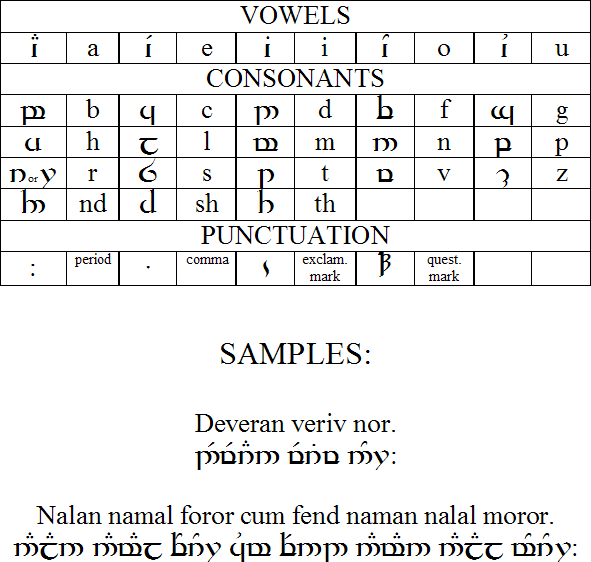Difference between revisions of "Devera"
| Line 146: | Line 146: | ||
| − | [[Image: | + | [[Image:DeveravTenuvar_chart.png|Deverav 'Tenuvar']] |
==Devera Nation Federation== | ==Devera Nation Federation== | ||
The [[Devera Nation Federation]] (or DNF for short) is a collection of nations, all of which have Devera as a major spoken language. | The [[Devera Nation Federation]] (or DNF for short) is a collection of nations, all of which have Devera as a major spoken language. | ||
Revision as of 21:33, 25 October 2005
Contents
Brief Information
Devera is a relatively new language, formed from a number of other languages. Its main purpose is to have the ideal grammatical system. While there are still some kinks that need to be addressed, it is generally very clean and orderly.
EXAMPLE:
Nalan net Deveral melor.
"I speak in Devera."
Pronunciation
===Vowels=== - (when not following or being followed by a vowel)
A – always pronounced as in, 'father.'
E – always as in 'bet.'
I – always as a long E, as in 'be.'
O – always as in 'go.'
U – always as in 'boot.'
===Diphthongs=== - Unless one of the four diphthongs outlined here, two or more subsequent vowels are pronounced separately (e.g. ae = 'ah-eh', ie = 'ee-eh', ou = 'oh-oo', etc.).
AI – long I sound as in 'climb,'
AU – as in 'cow.'
EI – as in 'bay.'
OI - as in 'toy.'
Consonants
C – always pronounced as a K. Pronouncing as S or any other letter is unacceptable.
R – When at the the end of a word, pronounced as in ‘for.’ When at the beginning or middle of a word, pronounced as in ‘lady’ or the Japanese R. Can also be rolled, as in the Spanish word ‘rojo,’ for extra formality.
Grammar
Basic Introductory Notes
Devera is free-order, which means that the parts of the sentence can be in any order and it will still work (SVO, SOV, VSO, whatever). This is because each type of word in a sentence has its own ending-letter conjugation so that it can be identified easily within a sentence.
Every root word (unconjugated) in the language starts with a consonant and ends with a vowel. Therefore, the dictionary forms of all of the words can easily be combined to make new meanings.
Devera does not use the letters J, K, Q, W, X, or Y.
If something is already understood in a conversation, it may be omitted from statements. For instance, if you and a friend are talking about cats, you can simply say 'are furry' instead of 'cats are furry'. It is implied that you are talking about cats, even though you didn't specifically say so.
Stress in the pronunciations of words varies depending on conjugation, compounding, and the speaker, so there is no standard stressing for any word.
Adjectives and adverbs precede the nouns or verbs they describe. No matter where the subject, object, or verb is located in the sentence, modifiers precede them.
Much like Japanese, consonants must be followed by a vowel unless they are a conjugation at the end of a word. This rule doesn't apply to 'LD', 'ND', 'TH', and 'SH'.
Conjugation
Verb conjugation:
O - Root
S - Past
R - Present
D - Present Alternate ("I am doing")
C - Future
Noun conjugation:
A - Root
N - Subject
L - Object
Root/conjugated others:
I/TH - Adverb
I/V - Adjective
E/ND - Conjunction
E/LD – Article
E/T – Preposition
U/M – Particle
U/Z – Phrase
Special Notes
THE ND AND LD ENDINGS: The letters N and D are only ever found directly next to each other as a conjugation. It will never be at the beginning or in the middle of a word, and is only found in conjunctions. Likewise, the letters L and D are only found next to each other as the article conjugation.
NOUN CONJUGATION: If there are a number of nouns in a sentence, but they are not identified as subjects or objects, they are all given the subject conjugation (N). For example, in “language and money,” neither ‘language’ nor ‘money’ are objects. In fact, there isn’t even a verb. So, both of the nouns are given the subject conjugation: “veran vend vunan.”
Also, if the subject or object of a sentence is made up of a list of nouns, each noun uses the conjugation of whatever element it's part of. So in 'I like apples, bananas, and oranges,' the words 'apples', 'bananas', and 'oranges' would all be conjugated as objects.
PLURALIZATION: To make a noun plural, use the indefinite articles ‘these’ and ‘those’. So literally, a plural noun like daseld hirodan would be translated as ‘these woman’. However, it just implies that there is more than one woman, and they are nearby. If they are farther away, you would use ‘those’ (dateld) to indicate such.
USING HIRIV: The adjective hiriv means ‘belonging to the aforementioned noun.’ When used in a sentence, it describes a noun as the possession of a noun mentioned in a previous sentence.
‘Dateld hinodan lagith melor. Nalan hiriv hasal moror.’
This literally translates into:
‘Those men unappealingly speak. I (belonging to the aforementioned people) darkness hate.’
Which can then be understood as:
‘Those men speak unappealingly. I hate the darkness that belongs to those men.’
And finally simplified as:
‘Those men speak unappealingly. I hate their darkness.’
Script
Devera uses a modified form of Tolkien's Elven Tengwar script. The chart is below.
Devera Nation Federation
The Devera Nation Federation (or DNF for short) is a collection of nations, all of which have Devera as a major spoken language.

